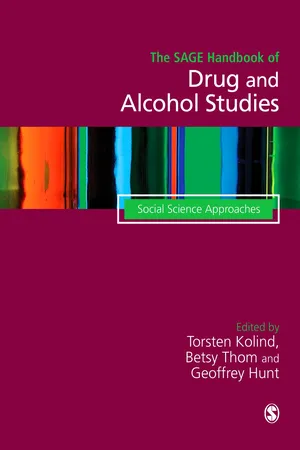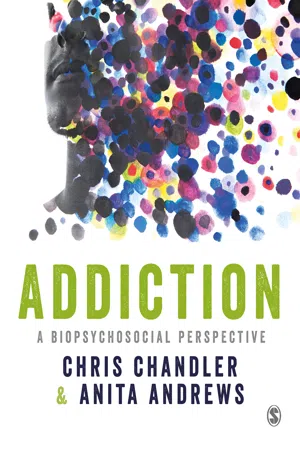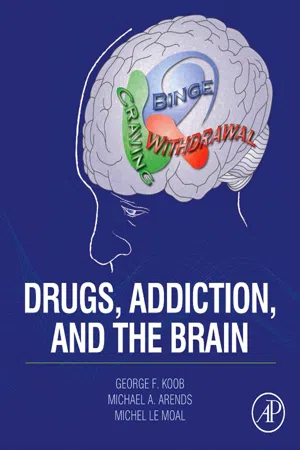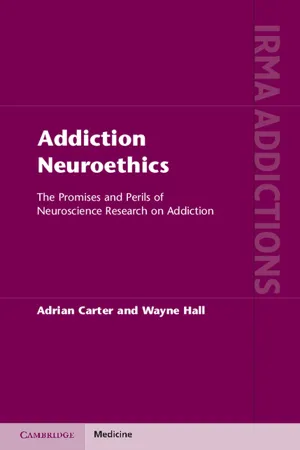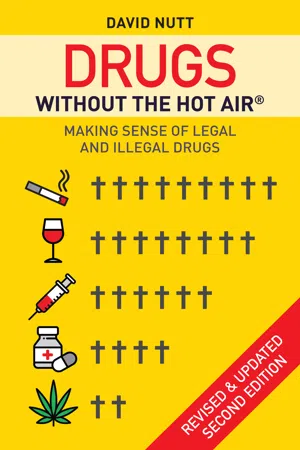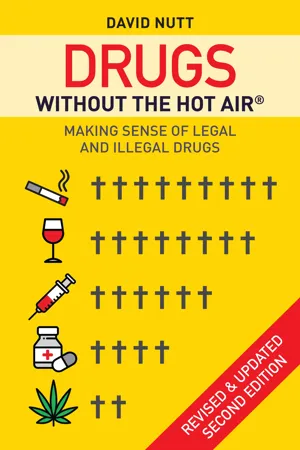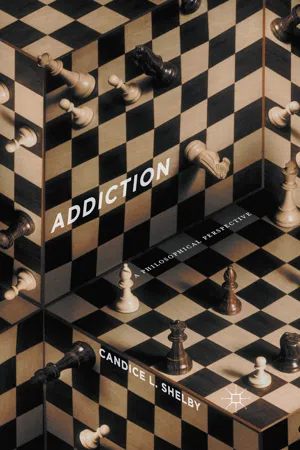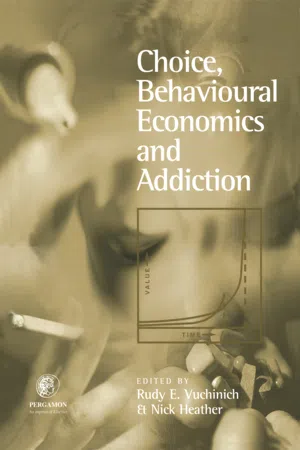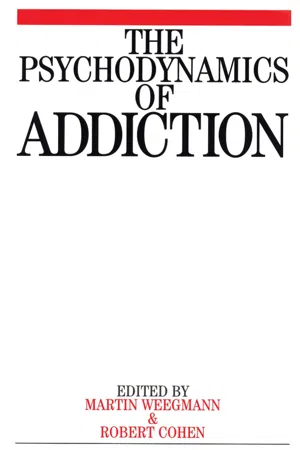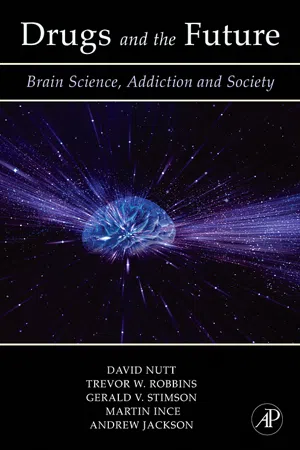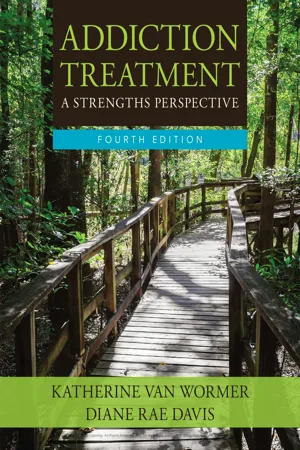Psychology
Addiction
Addiction refers to a complex condition characterized by compulsive engagement in rewarding stimuli despite adverse consequences. It is often associated with substance abuse, but can also manifest in behaviors such as gambling or gaming. Addiction involves changes in the brain's reward, motivation, and memory systems, leading to persistent cravings and a loss of control over the addictive substance or activity.
Written by Perlego with AI-assistance
Related key terms
1 of 5
12 Key excerpts on "Addiction"
- eBook - ePub
The SAGE Handbook of Drug & Alcohol Studies
Social Science Approaches
- Torsten Kolind, Betsy Thom, Geoffrey Hunt, Torsten Kolind, Betsy Thom, Geoffrey Hunt, Author(Authors)
- 2016(Publication Date)
- SAGE Publications Ltd(Publisher)
4 Psychological Explanations of AddictionRobert Hill and Jennifer HarrisIntroduction
Terms such as ‘Addiction’, ‘dependence’ and ‘excessive appetites’ are used to describe an individual’s overwhelming, intense desire to engage in a particular behaviour, despite the negative consequences of doing so. Addiction is typically thought of as relating to psychoactive substances but encompasses other behaviours that can become compulsive such as eating, gambling, sexual activity, exercising and shopping. While these behaviours are thought to share similar psychological processes, psychoactive substances exert an additional unique neurobiological impact on the brain, psyche and body. With repeated use, the body and mind can adapt to the substance so that, if prevented from taking the substance, they can enter a withdrawal state. This triggers the urge to use in order to gain relief and regain equilibrium. Tolerance develops so that the individual experiences the need for increasingly frequent doses of the substance to maintain biological, neurological and psychological homeostasis. Alongside the typical cycle of craving, substance-seeking and use, relief and withdrawal, there is a concomitant narrowing of interests, social contact and lifestyle in order to focus on the substance. It may seem perplexing that the behaviour continues despite the dwindling positive effects of substance use over time, together with the considerable negative impact on physical and mental health, social, financial and legal aspects of life. Moreover, substance dependence has historically been viewed in terms of a chronic relapsing condition with periods of remission and relapse. The two major psychiatric diagnostic systems, the World Health Organisation's International Classification of Mental and Behavioural Disorders (ICD-10; WHO, 1992) and the American Diagnostic and Statistical Manual of Mental Disorders, Version 5 (DSM-5; APA, 2014), clearly describe the above physiological, behavioural, cognitive and social features of excessive and dependent substance use. - eBook - ePub
Addiction
A biopsychosocial perspective
- Chris Chandler, Anita Andrews(Authors)
- 2018(Publication Date)
- SAGE Publications Ltd(Publisher)
The term ‘Addiction’ is defined according to the historical, social and cultural context in which it is used, and it can be defined in slightly different ways for different purposes. The meaning and assumed implication behind the use of this word have also changed throughout history (Alexander, 2008). At various points in time, Addiction has been thought of as a moral weakness, a medical condition, a socially determined behaviour, and the product of a dysfunctional brain (Rehm, 2014). There is still no clear consensus on the definition of the word because it involves both objective and subjective elements. Addiction is generally understood to mean a loss of self-control and compulsion with regard to an activity or substance.In the current context, Addiction can be defined as:A repeated powerful motivation to engage in a purposeful behaviour that has been acquired as a result of previously engaging in that behaviour, with significant potential for unintended harm. (adapted from West and the EMCDDA, 2013)This definition manages to define Addiction, but does not try to explain or describe the underlying mechanisms and associated symptoms, which can vary in their presence and severity between individuals and between different addictive agents (e.g. behavioural Addictions and substance Addictions).Addiction can refer to the pathological consumption of alcohol, tobacco and other drugs, but can also encompass other behaviours, for example, compulsive eating, gambling, shopping and internet use. There is evidence for some underlying commonalities in the neurotransmitters and brain circuits involved in some substance and non-substance related behavioural Addictions such as gambling (which will be explored in Chapter 8), however, throughout this book we will be primarily referring to drug Addiction (inclusive of alcohol Addiction) unless otherwise stated.Consider the American Society of Addiction Medicine’s (2018) definition of Addiction, which is described in their Public Policy Statement (released April, 2011) as follows:Addiction is a primary, chronic disease of brain reward, motivation, memory and related circuitry. Dysfunction in these circuits leads to characteristic biological, psychological, social and spiritual manifestations. This is reflected in an individual pathologically pursuing reward and/or relief by substance use and other behaviours. - eBook - ePub
- George F. Koob, Michael A. Arends, Michel Le Moal(Authors)
- 2014(Publication Date)
- Academic Press(Publisher)
Chapter 1 What is Addiction? Abstract This chapter defines Addiction as a chronic relapsing disorder characterized by compulsive drug seeking, a loss of control in limiting intake, and emergence of a negative emotional state when access to the drug is prevented. The definition of Addiction is derived from the evolution of the concept of dependence and the nosology of Addiction diagnosis. A distinction is made between drug use and substance use disorders (formerly abuse and dependence). Addiction affects a large percentage of society and has enormous monetary costs. Addiction evolves over time, moving from impulsivity to compulsivity and ultimately being composed of three stages: preoccupation/anticipation, binge/intoxication, and withdrawal/negative affect. Motivational, psychodynamic, social psychological, and vulnerability factors all contribute to the etiology of Addiction, but this book focuses on the neuroadaptational changes that occur during the Addiction cycle. A theoretical framework is described that derives from early homeostatic theories and subsequent opponent process theories to provide a framework for understanding the neurobiology of Addiction - eBook - PDF
Addiction Neuroethics
The Promises and Perils of Neuroscience Research on Addiction
- Adrian Carter, Wayne Hall(Authors)
- 2011(Publication Date)
- Cambridge University Press(Publisher)
We begin with a brief review of common or folk understandings of Addiction, and the clinical accounts of addictive behaviour that have informed these common-sense views. We then examine the impact that drug use and addic- tion has upon society and the way in which societies have typically responded to it. We conclude by analysing the two dominant models that have been used 19 to explain Addiction, the medical and moral, and discuss the relevance of neuroscience research to these models. 2.2. The phenomenology of Addiction Addiction is a complex and highly heterogeneous condition that encompasses an array of problematic behaviours that evolve over time in different individ- uals in different ways. This can make defining Addiction difficult. It is reflected in the terminology used to describe addictive patterns of drug use, namely, ‘Addiction’, ‘dependence’ or ‘substance use disorder’. Addiction is often contrasted with dependence. An individual may be physically or psychologically dependent on a drug or both. People can become physically dependent on a substance without being addicted. Physical dependence involves the compen- satory physiological changes that result from the repeated use of a drug, with the result that rebound aversive symptoms often occur when drug use is abruptly stopped. This is often called a withdrawal syndrome. Some drugs may also produce a discontinuation syndrome that occurs upon abrupt cessation of use, such as the selective serotonin reuptake inhibitors (SSRIs), without producing the drug-seeking behaviour that is characteristic of Addiction (Nutt, 2003). Psychological dependence encompasses the variety of psychological changes that drive drug use or makes one feel that they need to use drugs. - eBook - ePub
- David M. Warburton(Author)
- 2023(Publication Date)
- CRC Press(Publisher)
Some psychologists and sociologists assert that animal studies do not model the important psychological variables governing drug use. They suggest that psychological processes critical in the etiology of use cannot be studied in animal models and/or that environmental influences important in producing use cannot be duplicated in animal studies. This position is generally untenable, and animal models have been developed that accurately represent the primary processes involved in drug “Addiction”. Support for the validity of these animal models will emanate from an understanding of the characteristics and the neural basis of drug use summarized in the following sections. The arguments presented in the chapter are tenable, but they represent only one of several perspectives used in studying substance use. The terminology and even some aspects of the empirical data are the topics of scientific debate. The objective of this chapter is not to provide a balanced presentation of controversial issues, but rather to develop a unifying framework for understanding the psychobiological basis of “Addiction”.CONCEPT OF Addiction
Before proceeding with an examination of the mechanisms underlying drug Addiction, it is necessary to define the term Addiction and to examine its main characteristics. Delineation of the salient attributes of a phenomenon helps to establish the criteria that must be fulfilled in a valid animal model and helps to determine what biological processes are relevant to its etiology.Issue of Terminology
Drug Addiction refers to a situation where drug procurement and administration appear to govern the organism’s behaviour, and where the drug seems to dominate the organism’s motivational hierarchy. Jaffe (1975) has described Addiction as“a behavioral pattern of compulsive drug use, characterized by overwhelming involvement with the use of a drug, the securing of its supply, and a high tendency to relapse after withdrawal [abstinence].”(Jaffe, 1975 ; pp. 285)This definition follows the general lexical usage of the term and is consistent with the word’s etymology (see Bozarth, 1987a ).Drug Addiction is defined behaviourally; it carries no connotations regarding the drug’s potential adverse effects, the social acceptability of drug usage, or the physiological consequences of chronic drug administration (Jaffe, 1975 ). This latter point is especially important because some investigators have mistakenly used the term “Addiction” to describe the development of physical dependence (see Bozarth, 1987a , 1989 ; Jaffe, 1975 - No longer available |Learn more
Drugs without the hot air
Making sense of legal and illegal drugs
- David Nutt(Author)
- 2020(Publication Date)
- UIT Cambridge(Publisher)
Chapter 9. What is Addiction? Is there an “addictive personality”?
Using substances from outside the body to change our brain chemistry is something humans have always done, and the psychoactive effects created are similar to the changes we experience when we eat nice food or take exercise. For the majority of people the majority of the time, this doesn’t lead to compulsive behaviour – we remain in control, and pretty soon our brains return to their prior state. For a minority, however, drug use leads to drug abuse and Addiction, just as a minority of people become addicted to food, gambling or sex. For these people, satisfying their cravings for whatever it is they’re addicted to becomes the most powerful source of motivation in their lives, overpowering every other need and often leading them to harm themselves and others.There are three elements that affect whether a person becomes addicted to a particular drug (Figure 9.1 ):Figure 9.1: The three elements that affect whether a person becomes addicted to a particular drug.1. Drug-related factors include how the drug reaches the brain, and what it does when it gets there. Tolerance and withdrawal also affect its addictiveness.2. Social factors include the availability and acceptability of using the drug, the prevalence of advertising, how the drug makes groups behave, and the economic and social costs.3. Personal and biological factors are those such as age, gender and genetics.In this chapter we look at the mechanisms of Addiction, tolerance and withdrawal, and why certain people seem to have “addictive personalities”. (Chapter 4 has already examined some of the drug-related factors, which we explore in more detail in chapter 11 , and we cover the social factors in chapter 12 .)Addiction in history
Our understanding of Addiction has increased as more drugs have become available, and as their role in society has changed. Until the 19th century, heavy drinking or use of other drugs wasn’t seen as a special category of behaviour, but as a sin of excess, similar to overeating – gluttony was a problem because you were eating too much , not because food itself was a bad thing. Although excessive use of drugs was seen as problematic, the majority of people usually didn’t have access to enough potent substances to have that problem. An exception was the † Gin Craze of the 18th - eBook - PDF
Drugs without the hot air
Making sense of legal and illegal drugs
- David Nutt(Author)
- 2020(Publication Date)
- UIT Cambridge Ltd.(Publisher)
168 Chapter 9. What is Addiction? Is there an “addictive personality”? Using substances from outside the body to change our brain chem- istry is something humans have always done, and the psychoactive effects created are similar to the changes we experience when we eat nice food or take exercise. For the majority of people the majority of the time, this doesn’t lead to compulsive behaviour – we remain in control, and pretty soon our brains return to their prior state. For a minority, however, drug use leads to drug abuse and Addiction, just as a minority of people become addicted to food, gambling or sex. For these people, satisfying their cravings for whatever it is they’re addicted to becomes the most powerful source of motivation in their lives, overpowering every other need and often leading them to harm themselves and others. There are three elements that affect whether a person becomes addicted to a particular drug (Figure 9.1): Figure 9.1: The three elements that affect whether a person becomes addict- ed to a particular drug. 1. Drug-related factors include how the drug reaches the brain, and what it does when it gets there. Tolerance and withdrawal also affect its addictiveness. 2. Social factors include the availability and acceptability of using the drug, the prevalence of advertising, how the drug makes groups behave, and the economic and social costs. Chapter 9. What is Addiction? Is there an “addictive personality”? 169 3. Personal and biological factors are those such as age, gender and genetics. In this chapter we look at the mechanisms of Addiction, tolerance and withdrawal, and why certain people seem to have “addictive per- sonalities”. (Chapter 4 has already examined some of the drug-related factors, which we explore in more detail in chapter 11, and we cover the social factors in chapter 12.) Addiction in history Our understanding of Addiction has increased as more drugs have become available, and as their role in society has changed. - eBook - PDF
Addiction
A Philosophical Perspective
- C. Shelby(Author)
- 2016(Publication Date)
- Palgrave Macmillan(Publisher)
To begin at the most obvious place, let us consider that the “disease” of Addiction is defined for clinical purposes in psychological terms. According to what has become a fairly standard formulation among disease model theorists, [d]rug Addiction is a chronically relapsing disorder that has been characterized by (1) compulsion to seek and take the drug, (2) loss of control in limiting intake, and (3) emergence of a negative emotional state (e.g., dysphoria, anxiety, irritability) reflecting a motivational withdrawal syndrome when access to the drug is prevented. 3 Addiction here is characterized by behavioral and emotional symp- toms, in terms of feelings and states of mind. More specifically, it is marked by three distinct “stages,” according to Nora Volkow, director of the National Institutes for Drug Addiction, and her highly respected coauthor George Koob. These stages, which collectively constitute what has come to be known as the “addictive cycle” include “‘binge/intoxi- cation,’ ‘withdrawal/negative affect,’ and ‘preoccupation/anticipation’ (craving).” 4 These stages follow on one another with increasing regu- larity, according to the disease model, given chronic exposure to an addictive drug, with increasing intensity, until the addict “loses his Addiction and the Individual 37 ability to control” his actions. The DMS-IV-TR lists four classes of drug as capable of instituting this cycle: psychostimulants (methamphetamine, cocaine), opiates (heroin, morphine, oxycontin), alcohol, and nicotine. Gambling is the only activity currently listed among the addictive disor- ders, and even that is characterized as an impulse control disorder and not as an Addiction per se. It is described, though, in terms nearly iden- tical to those used with substance abuse and dependence, and the list is liable to grow. - eBook - PDF
- Nick Heather, Rudy E. Vuchinich(Authors)
- 2003(Publication Date)
- Pergamon(Publisher)
Environmental factors thus determine who (and how many) will develop an Addiction. For instance, in relation to alcohol, it is well documented that the availability of the substance has an impact on aggregate consumption, as well as on the prevalence of heavy consumption and problem rates (Edwards et al. 1994). Secondly, drug taking behaviour is typically conformist behaviour: The likelihood that any given individual will engage in this sort of behaviour and the extent to which he is doing so very much depends on what other individuals are doing.^ Hence, a theory of Addiction should not restrict itself to the agent's level of socializing, as Rachlin's theory does; it also need to take into consideration who the agent is socializing with, and in particular the drug-taking habits of these individuals. Just as loneliness under certain circumstances may foster Addiction, so may strong integration into a heavy consuming sub-culture. Notes 1. This is not a reductionistic thesis, since I do not claim that we could replace all mentalistic concepts, such as values, preferences, feelings, motivations and intentions, with a purely physicalistic terminology. 2. Edwards et al. (1982) prefer the term neuro-adaption instead of physical dependence. 3. A realistic version of simultaneous inconsistency could be the following. The agent has good and noble reasons for abstaining, but stronger and less noble (in his own hierarchy) reasons for indulging. He may feel that indulgence is morally wrong, say by inflicting harm on significant others, and he may wish that he did not have the appetite (a secondary preference for abstention), but still he gives in to his lower, selfish motives. 4. Certain allergies offer an example: the clinician needs to provoke the patient's body in order to reach a definitive diagnosis. - eBook - PDF
- Martin Weegmann, Marcel Cohen(Authors)
- 2008(Publication Date)
- Wiley(Publisher)
The patient in denial displays the features of a failure to cope with the demands that life presents (when the psychoactive drug is used as an alternative, simple - but entirely ineffective - solution to life problems), with recovery involving the development of these mechanisms that occur in most other people as the transition from adolescence to adulthood is successfully negotiated. Indeed, the current author would suggest that Addiction to any psychoactive drug (including tobacco) is primarily a variant of a psychological disorder in which the person either fails to develop adult psychological mechanisms of self-efficacy (primary Addiction) or when under great stress regresses to use of the psychological mechanisms that are appropriate in childhood (secondary Addiction). In Addiction to a psychoactive substance, the drug is being substituted for more sophisti- cated, adult mechanisms of behaving. Developmental changes To clarrfy this argument that Addiction is a disorder of psychological devel- opment, a schematic representation of developmental changes in psychology over time is presented here. Human beings have developed to have a prolonged childhood in which the child is looked after by the parent. The newborn child At birth, the newborn child is entirely dependent on its parents (usually mother) or other carer to meet its needs for food, warmth, affection and bodily toilet. Having not yet acquired a number of skills, such as speech, locomotion and fine grasp, the infant can neither obtain directly nor communicate clearly to its parent what is needs or wants at the time. The child can only communicate non-verballywith a cry, and it cannot directly enforce its carer to do its bidding. Thus, the child has to rely on the carer to interpret what its needs are for it and can only use manipulative techniques to ensure that the parent will attend to it. A psychological - eBook - PDF
Drugs and the Future
Brain Science, Addiction and Society
- David J. Nutt, Trevor W. Robbins, Gerald V. Stimson, Martin Ince, Andrew Jackson(Authors)
- 2006(Publication Date)
- Academic Press(Publisher)
6 CONCLUSION: CURRENT SCIENCE CAPABILITY AND DEVELOPMENTS IN THE NEXT 10 YEARS Two developments are taking place at the present time which together make a strong case for placing behavioural Addictions near the centre of our thinking over the next 10 years or so. The first is the growing awareness of the dangers to society and its citizens posed by Addiction to activities that do not involve the ingestion of a substance. As well as gambling, sex Addiction, with its implications for the nation’s sexual health, is one example. Eating Addiction in the form of binge eating disorder is another, with obvious implications for the nation’s health. The other quite recent development is the appearance of biological and psychological models of Addiction which, unlike earlier models, can embrace non-substance addic- tions with ease. For these models the distinc- tion between substance and non-substance Addictions is less important than for earlier generations of Addiction models such as that based on neuroadaptation and withdrawal relief. What is currently lacking is for addic- tion researchers who have specialised in either substance or non-substance Addictions to extend their work to include both. There is a small but growing science capa- bility in gambling and gambling Addiction. Small but active groups with special exper- tise in psychosocial and biological aspects exist in Australia, where the prevalence of gambling Addiction is the highest recorded, and the US and Canada. In the UK there is a small number of active individuals. Other European countries with some capacity are Spain, where concern has been high and there is an active biological group in Madrid; Italy, with a biological group in Milan; the Netherlands; and Sweden, which, besides the UK, is the only European country to have mounted a national prevalence study. A further shortcoming is the over- specialisation of Addiction research. - eBook - PDF
- Katherine van Wormer, Diane Davis(Authors)
- 2017(Publication Date)
- Cengage Learning EMEA(Publisher)
PART 3 The Psychology of Addiction T Copyright 2018 Cengage Learning. All Rights Reserved. May not be copied, scanned, or duplicated, in whole or in part. WCN 02-300 Copyright 2018 Cengage Learning. All Rights Reserved. May not be copied, scanned, or duplicated, in whole or in part. WCN 02-300 CHAPTER 6 LEARNING OBJECTIVES LO1 LO2 LO3 LO4 LO5 LO6 Addiction Across the Life Span Copyright 2018 Cengage Learning. All Rights Reserved. May not be copied, scanned, or duplicated, in whole or in part. WCN 02-300 246 CHAPTER 6 of the young. Although this emphasis on risk-taking behaviors by teens and college-age youth is reflected in this chapter, attention is also devoted to problems in the so-called baby boom generation of social experiences as well as longitudinal to addictive behavior that is found during the final stage of life. THE STAGES OF GROWTH AND DEVELOPMENT The behavioral problems associated with alcohol and other drugs emerge, in most peo- ple, during late adolescence and early adulthood (Agrawal, Sartor, Lynskey, et al., 2009). Identifying and understanding the course of those problems, accordingly, require a devel- opmental perspective. Many of the risk factors can already be spotted in early childhood by children’s parents, teachers, and counselors, even as early as preschool. Erik Erikson (1963) constructed a model of psychosocial development consisting of eight stages. His model, like other models of growth and development across the life span, focused on how an individual’s personality interacts with biological and social systems to affect behavior. From birth to old age, in this conceptualization, life consists of a chrono- logical series of age-related developmental stages and tasks that need to be completed. For the practitioner, knowledge of psychological milestones normally negotiated, such as during adolescence and young adulthood, is important for the overall assessment of behavior and functioning (Zastrow & Kirst-Ashman, 2013).
Index pages curate the most relevant extracts from our library of academic textbooks. They’ve been created using an in-house natural language model (NLM), each adding context and meaning to key research topics.
